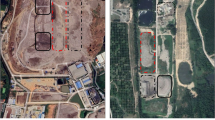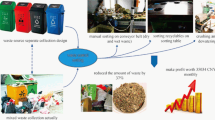Abstract
Material Recovery Facilities (MRF) shall play a strategic role in developing countries to satisfy the sustainable development. The aim of this paper is to carry out a scenario-based techno-economic assessment of a local government MRF located in Madaba, Jordan. Two operational scenarios were identified to improve the recycling process and to increase the economic revenues. The first scenario includes a sorting process with and without a ballistic separator and the second is a Refused Derived Fuel (RDF) production scenario. An economic model was developed and it relied on the investment indices namely, NPV, ERR and the payback period. The results indicated that a product-recycling scenario with three working shifts is feasible starting from a process feed capacity of 14,500 and 12,700 ton/y with and without a ballistic separator, respectively. The External Rate of Return (ERR) achieved with and without the ballistic separator was 24.6% and 21.3%, respectively and the payback period was 4 years for both cases. The second scenario consisted of exploring the economic feasibility of RDF production, which was feasible starting from an 80% MSW collection level and a selling price of 70 JOD/ton of RDF. An RDF price higher than 117 JOD/ton is cost effective at the other proposed collection levels.













Similar content being viewed by others
Data availability
The datasets generated during and/or analyzed during the current study are available from the corresponding author on reasonable request.
References
Aljaradin M (2014) Solid waste management in Jordan. Int j acad 4(11):138–150. https://doi.org/10.6007/IJARBSS/v4-i11/1289
Chopra M, Reinhart D, El-Shaar W (2001) US-Jordan Municipal Solid Waste Management Collaborative Research. The national Science Foundation (NSF), Final Report
Ikhlayel M, Higano Y, Yabar H, Mizunoya T (2016) Introducing an integrated municipal solid waste management system: assessment in Jordan. J Sustain Dev 9(2):43–53. https://doi.org/10.5539/jsd.v9n2p43
Abu-Qdais H, Gibellini S, Vaccari M (2017) Managing solid waste under crisis: The Case of Syrian Refugees in Northern Jordan. Sardinia 2017 / Sixteenth International Waste Management and Landfill Symposium
Saidan M, Abu Drais A (2016) Waste sorting informative booklet. Jordan Green Building Council, Jordan
Aldayyat E, Saidan M, Abu Saleh M, Hamdan S, Linton C (2019) Solid Waste management in Jordan: impacts and analysis. J Chem Technol Metall 54(2):454–462
SweepNet (2010) The regional solid waste exchange of information and expertise network in mashreq and Maghreb countries, Country Report on the Solid Waste Management in Jordan
UNDP (2015) Solid waste value chain analysis of solid waste in the Jordanian Governorates of Irbid and Mafraq Final report. Mitigation the impact of the Syrian refugee crisis on Jordanian vulnerable host communities for UNDP Jordan. Disaster Waste Recovery. Jordan
Elnaas A (2015) Actual situation and approach for municipal solid waste treatment in the Arab region. PhD Thesis, University Rostock, Germany
GIZ (2019) Deutsche Gesellschaft für Internationale Zusammenarbeit (GIZ) GmbH annual report, Jordan
Lin HY, Tsai ZP, Chen GH, Kao JJ (2011) A model for the implementation of a two-shift municipal solid waste and recyclable material collection plan that offers greater convenience to residents. J Air Waste Manage Assoc 61(1):55–62. https://doi.org/10.3155/1047-3289.61.1.55
Gharagheer F, Hamdi M, Bazlamit S (2018) Recovery of recyclables of municipal solid waste: a case of Jordan. J Env Eng Sci 14(4):1–24. https://doi.org/10.1680/jenes.18.00028
Pressley P, Levis J, Damgaard A, Barlaz M, De Carolis J (2015) Analysis of material recovery facilities for use in life-cycle assessment. Waste Manage 35:307–317. https://doi.org/10.1016/j.wasman.2014.09.012
Putra HP, Damanhuri E, Sembiring E (2020) The role of MRF in Indonesia’s solid waste management system (case study of the Special Region of Yogyakarta, Indonesia). Mater Cycles Waste Manag. https://doi.org/10.1007/s10163-020-00979-7
Neto R, Gastineau P, Cazacliu B, Le Guen L, Paranhos R, Petter C (2017) An economic analysis of the processing technologies in CDW recycling Platforms. Waste Manage 60:277–289. https://doi.org/10.1016/j.wasman.2016.08.011
Arina D, Kļavenieks K, Burlakovs J (2014) The Cost-estimation of Mechanical Pre-treatment Lines of Municipal Solid Waste in Latvia. Proc Latv Univ Agr 32(327):17–28. https://doi.org/10.2478/plua-2014-0009
Hemidat S, Saidan M, Al-Zu’bi S, Irshidat M, Nassour A, Nelles M, (2019) Potential utilization of RDF as an alternative fuel for the cement industry in Jordan. Sustainability 11(20):5819. https://doi.org/10.3390/su11205819
Alsheyab M, Schingnitz D, Al-Shawabkeh A, Kusch S (2013) Analysis of the potential use of major refuse-derived fuels in Jordan as supplementary fuel. J Air Waste Manage Assoc 63(8):902–908. https://doi.org/10.1080/10962247.2013.776998
Organisation for Economic Co-operation and Development OECD (2019) https://data.oecd.org/price/producer-price-indices-ppi.htm. Accessed 01 August 2019.
Cimpan C, Maul A, Wenzel H, Pretz T (2016) Techno-economic assessment of central sorting at material recovery facilities – the case of lightweight packaging waste. J Clean Prod 112(5):4387–4397. https://doi.org/10.1016/j.jclepro.2015.09.011
National Electrical Power Company NEPCO (2019) http://www.nepco.com.jo/. Accessed 15 June 2019
Al-Khashman O (2013) Evaluation of the potential use of municipal solid waste for recovery options: a case of Ma’an City, Jordan. J Earth Environ Sci 5:9–16
Department of Statistics DOS (2019) http://dosweb.dos.gov.jo/products/jordan-in-figures2008/. Accessed 15 June 2019
Franchetti M (2009) Case study: Determination of the economic and operational feasibility of a material recovery facility for municipal recycling in Lucas County, Ohio, USA. Resour Conserv Recycl 53:535–543. https://doi.org/10.1016/j.resconrec.2009.04.004
Sullivan W, Wicks E, Koelling C (2015) Engineering Economy. Pearson, UK
Zeno (2019) https://www.zeno.de/en/products/details/product/windsichter-zws/product.html. Accessed 1 August 2019.
Atlascopco (2019) https://www.atlascopco.com/content/dam/atlas-copco/compressor-technique/industrialair/documents/leaflets/compressors/aq1555/AQ_antwerp_leaflet_EN_2935087845.pdf. Accessed 1 August 2019
Athanassiou M, Zabaniotou A (2008) Techno-economic assessment of recycling practices of municipal solid wastes in Cyprus. J Clean Prod 16:1474–1483
Gadaletaa G, De Gisia S, Binettib S, Notarnicolaa M (2020) Outlining a comprehensive techno-economic approach to evaluate theperformance of an advanced sorting plant for plastic waste recovery. Process Saf Environ Prot. https://doi.org/10.1016/j.psep.2020.07.008
Al-Athamin E, Hemidat S, Al-Hamaiedeh H, Aljbour S, El-Hasan T, Nassour A (2021) A techno-economic analysis of sustainable material recovery facilities: The case of Al-Karak solid waste sorting plant, Jordan. Sustainability 13:13043. https://doi.org/10.3390/su132313043
Materials Recovery Facility Assessment: Recyclables Characterization King County Waste Monitoring Program September 2020. Department of Natural Resources and Parks. Solid waste division. www.kingcounty.gov/solidwaste
Punin W, Maneewan S, Punlek C (2014) The feasibility of converting solid waste into refuse-derived fuel 5 via mechanical biological treatment process. J Mater Cycles Waste Manag 16:753–762. https://doi.org/10.1007/s10163-013-0215-9
https://cfnielsen.com/briquetting-solid-waste/ accessed 09/06/2022
Acknowledgements
This research is accomplished as a contribution to the Waste to Positive Energy (Wt(P)E) project in Jordan. We thank our colleague Dr. Abdallah Nassour from the University of Rostock who provided insight and expertise that greatly assisted the research and Dr. Safwat Hemidat for his valuable input.
Funding
This work was supported by the Federal Ministry for Economic co-operation and Development (BMZ) through grant contract Deutsche Gesellschaft für Internationale Zusammenarbeit GIZ “Waste to positive Energy (Wt(P)E) project”.
Author information
Authors and Affiliations
Contributions
This work has been derived from the MSc. thesis of the student [AAlH], which was under the supervision of [AAy]. All authors contributed to the study conception and design. The experimental approach was set by all authors. Data collection was performed by [AAlH]. The data analysis was performed by [AA], [AAlH]. The first draft of the manuscript was written by [AA] and all authors added their comments on previous versions of the manuscript. All authors read and approved the final manuscript.
Corresponding author
Ethics declarations
Conflicts of interest
The authors declared no potential conflicts of interest with respect to the research, authorship, and/or publication of this article.
Additional information
Publisher's Note
Springer Nature remains neutral with regard to jurisdictional claims in published maps and institutional affiliations.
Rights and permissions
Springer Nature or its licensor (e.g. a society or other partner) holds exclusive rights to this article under a publishing agreement with the author(s) or other rightsholder(s); author self-archiving of the accepted manuscript version of this article is solely governed by the terms of such publishing agreement and applicable law.
About this article
Cite this article
Abdelhay, A., Al-Hroub, A. & Al Sharif, M. Techno-economic assessment of waste sorting scenarios regional case study: Madaba sorting plant, Jordan. J Mater Cycles Waste Manag 25, 582–596 (2023). https://doi.org/10.1007/s10163-022-01543-1
Received:
Accepted:
Published:
Issue Date:
DOI: https://doi.org/10.1007/s10163-022-01543-1




